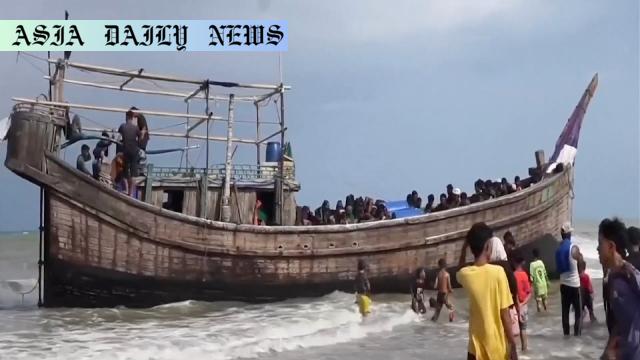Rohingya: Authorities in Indonesia report that dozens of Rohingya Muslims have landed in Aceh Province, possibly victimized by human trafficking syndicates.

The Arrival of Rohingya Refugees in Indonesia
In a humanitarian crisis that continues to unfold, over 70 Rohingya refugees arrived on the eastern coast of Aceh Province, Indonesia, on Wednesday afternoon. The boat, reported to have set off from Cox’s Bazar in Bangladesh, adds to a growing number of refugee arrivals. Local authorities suspect the involvement of human trafficking syndicates, which raises serious concerns about the safety and well-being of these vulnerable individuals.
Broader Crisis: Over 2,400 Rohingya Arrivals Since November
The latest arrivals are part of a much larger crisis. Reports from the United Nations Refugee Agency (UNHCR) indicate that since November 2023, over 2,400 Rohingya refugees have arrived in Aceh and North Sumatra provinces. This statistic alone highlights the gravity of the situation as more people flee persecution, particularly from Myanmar, where the Rohingya ethnic minority faces continuous violence and systemic discrimination.
Role of Human Trafficking Syndicates
Authorities suspect that human trafficking syndicates are behind the steady influx of refugees using Indonesia as a transit point toward Malaysia. Such exploitation places the refugees in a state of further vulnerability, amplifying their already dire circumstances. Evidence suggests that traffickers promise safe passage in exchange for exorbitant fees, only for refugees to be stranded or abandoned in perilous conditions.
Support and Relocation Efforts
The refugees who landed on Wednesday were taken to temporary shelters, where they are being supported by the United Nations High Commissioner for Refugees (UNHCR) and the International Organization for Migration (IOM). Similar efforts have been carried out with previous groups who arrived earlier this month. These organizations aim to provide relief, healthcare, and legal assistance to help the refugees navigate their hardships.
Global Responsibility and the Need for Action
The plight of the Rohingya is not solely a Southeast Asian issue—it is a humanitarian crisis of global significance. Southeast Asian governments have long struggled to respond to refugee flows, often citing limited resources and growing regional tensions as barriers. However, the international community must rally support for equitable burden-sharing, as well as long-term solutions addressing the systemic causes of Rohingya persecution.
Seeking Sustainable Solutions
Humanitarian solutions alone cannot address the underlying causes of the Rohingya’s forced migration. Significant diplomatic and political efforts are required to press for systemic reforms in Myanmar while ensuring accountability for human rights violations. Regional bodies like ASEAN and international organizations like the United Nations must take a more proactive stance in resolving the crisis.
Commentary
The Heartbreaking Plight of the Rohingya
The ongoing crisis surrounding the Rohingya refugees is a stark reminder of the world’s collective failure to protect some of its most vulnerable populations. The landing of over 70 refugees in Aceh Province is not just a regional issue but an urgent global problem that demands immediate attention and action.
Addressing the Root Causes
While nations like Indonesia try to provide temporary relief, the root causes of Rohingya persecution lie in their home nation of Myanmar. Systemic discrimination, lack of citizenship, and violent crackdowns have forced the Rohingya to undertake perilous journeys in hopes of survival. Until these fundamental injustices are addressed, the crisis will persist, and the burden will fall disproportionately on neighboring countries.
The Role of Humanitarian Organizations
It is heartening to see organizations like UNHCR and IOM stepping in to provide care for the refugees. However, these groups are often constrained by inadequate funding and limited regional cooperation. For these efforts to be sustainable, governments and international donors need to ramp up their support in a coordinated and effective manner.


